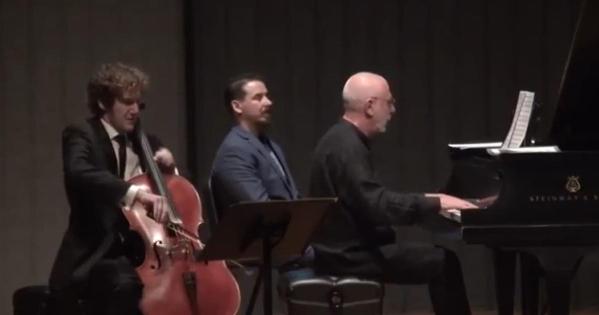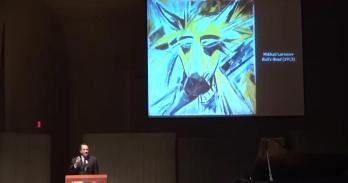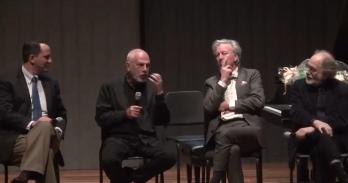The Russian Experiment 2017 Carmel Institute Symposium

In partnership with PostClassical Ensemble, the Carmel Institute hosted a unique symposium in November 2017, featuring live performances by world-renowned classical pianist Vladimir Feltsman. The symposium took a multilayered approach to the impact of the Great War and the Russian Revolutions of 1917 on Russian artists in the 1910s and 1920s as well as the socioeconomic and political changes of that era.
The symposium began with a delicious dinner of Russian dishes. After a short welcome and remarks from the Carmel Institute’s director, Anton Fedyashin, and the PostClassical Ensemble’s Executive Director Joseph Horowitz, the program itself began with music. Mr. Feltsman played several selections of Russian composer Alexander Scriabin, showing the composer’s complexity and inventiveness. Dr. Fedyashin then gave the audience an overview of the massive changes Russian society and culture experienced from the 1860s through 1917 and the plethora of artistic and intellectual movements within the arts in Russia and Europe in that era.
After a break for tea, coffee, and desserts, Dr Fedyashin returned to extend his historical contextualization from 1917 to 1928, a period of startling artistic and intellectual experimentation. The visual examples of paintings, architecture, propaganda, and textile arts that he included in both talks clarified the connections between the Russian artists and artistic forms and illustrated the inventive and unique art created in the first decades of the 20th century as well as how that art reflected the cultural moment of that time.
After giving the audience the background canvas, so to speak, Mr. Feltsman took the stage once more, playing pieces from “Forgotten Russians” Alexander Mosolov, Nicolai Roslavets, and Alexander Protopopov, with Ben Capps playing the cello for select portions. These innovative Russian composers were among others whose work was buried precisely because of its inventiveness after Stalin announced “socialist realism” as the only acceptable art form in the Soviet Union. Mr. Feltsman concluded his performance with a bonus piece, playing a short composition by 12-year old Sashenka Scriabin, to give the audience time to relax from the tumultuous work of Mosolov, Roslavets, and especially Protopopov’s Piano Sonato No. 2, Op 5.
The symposium then wrapped up with a panel discussion and Q & A session with Dr. Fedyashin, Mr. Feltsman, PostClassical Ensemble’s Music Director, Angel Gil-Ordóñez, and Mr. Horowitz. The discussion ranged widely from the “Forgotten Russians,” to Bolshevik propaganda methods, and the PostClassical Ensemble’s live concert of Shostakovich’s film score during a screening of Grigori Kozintsev’s 1929 silent film “The New Babylon,” at the American Film Institute on March 30 and 31, 2018.
Watch the full symposium video.
Learn more about Vladimir Feltsman.
Learn more about Ben Capps.
Learn more about the PostClassical Ensemble.


